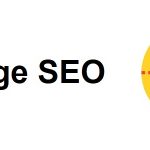On-Page SEO Checklist
There are two parts of Search Engine Optimization that we need to get right in order to successfully rank in Google. These two parts are On-page and Off-page SEO. On-page has do with the stuff that are one your website and Off-page is the opposite. Today we’ll be running through a checklist of some of the top items that you should have optimized for your On-page SEO.
Table of Contents
Keywords In Your Title
This is one of the most important steps for your SEO. You must focus on the keywords in your title on your page. It’s advised you keep those keywords closer to the beginning of the title as possible and make sure it sound completely natural not sounding like a bunch of words being thrown together.
When creating your title, make sure you stay within 40 to 70 characters. Anything longer than that will be cut off in searches. If you’re using WordPress as your CMS then plugins like Yoast SEO or All in One SEO pack plugin will help with character count.
Keywords In The Meta Descriptions
Now it’s time to include your keyword in the page’s meta description. It can increase your CTR if it is written in a way that will convince others even though the meta description does not directly affect your ranking. You need to pay close attention to your meta description for the best impact even if your ranking will be moderate.
As of late, Google has increased the length of meta descriptions, it’s still advisable you stay within 160 characters if possible. When creating your meta description, give it some serious thought about what will attract readers to click on your results versus your competitors. If you can’t seem to grasp the right words, check out the top-ranking pages in SERP’s and discover what they are doing for results.
Choosing Your URLs
Although this does not have the impact it used to, you should always take into consideration your targeted keywords. Always keep your URLs clean and keyword focused but not spammy.
The Value Of H1 Tags
Your H1 tag is the most critical information you will have on this page so stay focused! Make sure your heading tag is first and be sure to include your keyword along with a modifier if applicable.
Enhance Images with Data
When working with images it’s important to include your keywords in the file name of your image along with the title and alt tags. If you have a location then using a Geo-location tool to insert the latitude and longitude will help with location relevancy.
Keywords at the Beginning
Be sure to include your keywords in the first paragraph of your post as this is what Google, as well as other search engines, look at for ranking.
Importance of H2 And H3 Tags
Having H2 and H3 tags will help you form the content for your readers as well as search engines. These tags will offer a hierarchy for your page that is needed by search engines to know which headings carry the most weight. Also, having a variety of keywords in your headings will boost your page SEO.
Keyword Variations
It’s important to have your keyword throughout your post including any variations in your text, headings, and images. Synonyms of your keyword or alternative phrases such as LSI (Latent Semantic Indexing) keywords are also very important to make sure you have them added.
Don’t Forget Your Outbound Links
Stay away from “no follow” tags but use important links that are authoritative. Linking to reputable sites and/or sources will give Google trust in your site. On top of that, your readers will be directed to valuable information for them to discover.
Easy-to-Read Content
Not everyone reads the same way. Just because you’ve wrote a 3,000 word article or created an informational 10 minute video on your website does not mean that every person who sees it will take the time to consume its information. Some people read the beginning part and some may just scan to find the most relevant information. Regardless, your content should include your main keywords in the beginning and capture the audience’s attention.
Remember On-page is just half the work for ranking in Google successfully. The other part, Off-page SEO will come another day and it has to do with backlinking, etc. Your website could have an outstanding backlink profile, but if your website isn’t optimized for the right keywords then you’ll a hard time ranking. Sometimes when there are little to no competition then optimizing your On-page is all you need to rank.
Lastly is an informational video from Ahrefs explaining their checklist of On-page SEO.




